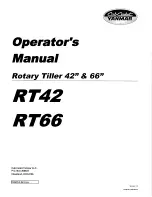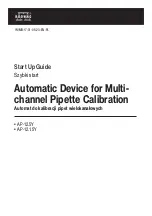
32
41
42
Italiano
English
Français
ARRESTO MOTORE - TRASPORTO
STOPPING THE ENGINE - TRANSPORTION
ARRÊT DU MOTOR - TRANSPORT
LEGGERE ATTENTAMENTE ANCHE IL MANUALE DEL
MOTORE.
ARRESTO MOTORE
Per arrestare il motore, portare la leva interruttore/
acceleratore (E Fig.41) sulla posizione “STOP”.
Nel caso in cui la posizione "OFF" (STOP) dell’interruttore
non funzioni, portare la leva starter nella posizione CLOSE per
arrestare il motore.
Verifica preliminare
ATTENZIONE: L’APPARATO DI TAGLIO NON DEVE MAI
RUOTARE QUANDO IL MOTORE È AL MINIMO. Girare
in senso antiorario la vite “T” della velocità minima
per ridurre il numero di giri al minuto del regime
minimo, oppure rivolgersi a un’officina autorizzata
per la registrazione e non utilizzare l’unità fino a
quando non viene riparata.
La rotazione dell’apparato di taglio quando il motore
è al minimo può provocare lesioni personali gravi.
L’uso di una frizione danneggiata può causare la rotazione
dell’apparato di taglio alla velocità minima e l’aumento del
rischio di lesioni personali dovute alla perdita del controllo e
al contatto con il dispositivo di taglio.
TRASPORTO
Trasporto a spinta - Accendere la macchina e accelerare
leggermente, questa avanzerà lentamente sulla punta dei
denti senza rovinare i vialetti; non è tuttavia consigliabile
procedere su un terreno molto compatto, ad esempio un
suolo asfaltato o rivestito in cemento.
CAREFULLY READ THE ENGINE INSTRUCTION MANUAL.
STOPPING THE ENGINE
To stop the engine set the switch/throttle trigger (E, Fig.41) to
“STOP”.
In the event that the "OFF" (STOP) position of the switch will
not function, pull the choke lever in the CLOSE position, to
stop the engine.
Pre-Operation Checking
WARNING: THE CUTTING ATTACHMENT SHOULD
NEVER TURN AT IDLE. Turn the idle speed screw “T”
counter-clockwise to reduce the idle RPM, or contact
a Servicing Dealer for adjustment and discontinue
use until the repair is made.
Serious personal injury may result from the cutting
attachment turning at idle.
A damaged clutch may cause a cutting attachment to rotate
at idle speed and increase the risk of personal injury from loss
of control and from contact with the cutting tool.
TRANSPORTATION
Transportation by pushing - Start the engine and gently
accelerate. The machine will slowly move forwards on the
end of the blade teeth, without damaging the path surface.
However, we recommend that you do not transport in this
way on very hard surfaces, e.g. tarmac and concrete.
LIRE ATTENTIVEMENT LE MANUEL DU MOTEUR.
ARRÊT DU MOTOR
Pour arrêter le moteur, mettre le levier interrupteur/
accélérateur (E, Fig.41) sur la position « STOP ».
Au cas où la position "OFF" (STOP) de l’interrupteur ne
fonctionnerait pas, coupez le moteur en ramenant le levier
d’accélérateur sur la position CLOSE (FERMER) pour arrêter le
moteur.
Contrôle avant utilisation
AVERTISSEMENT : L’OUTIL DE COUPE NE DOIT
JAMAIS TOURNER AU RALENTI. Tournez la vis de
réglage du ralenti “T” dans le sens anti-horaire
pour réduire le régime de ralenti ou contactez
un réparateur agréé pour procéder au réglage ;
n’utilisez pas la machine avant que la réparation
n’ait été effectuée.
Des blessures corporelles graves peuvent résulter du
fonctionnement au ralenti de l’outil de coupe.
Un embrayage défectueux peut être à l’origine du
mouvement au ralenti de l’outil de coupe et augmenter le
risque de blessure corporelle lié à la perte de contrôle de la
machine ou au contact accidentel avec l’outil de coupe.
TRANSPORT
Transport poussé - Mettre la machine en marche et
accélérer légèrement. La machine avance lentement sur le
bout des dents sans endommager les allées ; toutefois, il n’est
pas conseillé d’avancer sur un terrain très compact, tel qu’un
sol goudronné ou revêtu de ciment.
Summary of Contents for Bertolini 155
Page 52: ...52 NOTE ...
Page 55: ...55 NOTE ...
















































